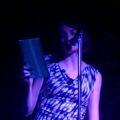Why We Read: Spells by Annie Finch
Let’s talk about Beck, shall we? The artist’s last record was nothing of the sort. As in, it wasn’t recorded at all. Song Reader was released only as sheet music. Why? Simply to be different? Perhaps. But perhaps it is also to raise a question about what the audience brings to their experience of the art. If the audience must also perform, then the art more wholly belongs to the audience. Art performed by the audience cannot be, in the words of Ian Burn “in the completeness of the artist’s concept” but must reside in the interplay of existence between the artifact and the audience.
While sheet music was once the normal distribution of songs to the world, now the performance (and hence the performer) is king. Beck’s Song Reader serves to dissever us from this dependency upon studio musicians holed up in a booth somewhere. But readers of poetry have rather always been freed of such constraints. Indeed, we are often at a loss when hearing our favorite poet read his or her poems because that poet rather steadfastly refuses to perform them. Would this were different.
On the page we are able to create our own performance. The problem with a poem, however, is one akin to all those non-musicians who picked up a copy of Song Reader. Namely, how on earth do you perform poetry—and how do I make that performance come close to what this poet had in his or her head? Annie Finch, at least, teaches us in her wonderful selected works, Spells.
In “The Poetics of the Open Work” Umberto Eco suggests the modern reader of literature is one who must carve their own meaning of a text from “infinite suggestive probabilities.” While theories that address the audience as a participatory member are at least five decades old, it is difficult to find criticism that hinges on the experience of the poetry being read and the audience hearing it.
While Eco is more concerned with works like Finnegans Wake or typographically complex verse, like Finch’s earliest work, he misses the bigger concern with on-the-page poetry and, missing this, skips entirely over performed poems. This is due in part to the all-too-frequent conflation of modes of writing, shown by his equitable inclusion of both prose and poetry in his discussions on writing. I’m sure most folks would argue today that the insistence upon differentiation is a distinction without a difference.
The “problem” of poetry lies in the actual difference between poetry and prose. Written prose is a transcription of spoken language, but written poetry is a transcription of a performance of language. Prose is language as it happens. Poetry is language as it sparkles, to abuse the cliché.
Which brings us to the back to the problem of performing poetry. Unlike dramatic presentations, concerts, or even spoken-word performances, on-the-page poetry is neither a performance nor a recording of a performance. It is, as I say, a transcription of a performance. It is the word-equivalent of sheet music. Every book of poetry is the equivalent of Beck’s Sound Reader being released amid a swarm of film and music and television—all things that are far easier to consume because they don’t require a performance.
During the bygone days before film and radio and T.V. and computers, sheet music publishers dominated the music industry and pianos were in every middle-class home. Kids learned how to play so they could entertain the family and guests. These at-home performances also included recitation of published plays and poetry and readings from novels. Kids learned how to recite these as well. This was a time when most publications, national and local, regularly included and featured poetry. I’m sure you’ve heard about it as a longed-for golden age when “everyone” read poetry. What happened?
What poetry didn’t do was adapt. We can’t surprise folks like Beck did because apparently all we do is put out sheet music. In an interview with The American Poetry Review, Finch said American poetry has “spun out into . . . various culturally based poetic movements, none of them having much to do with each other.” The first poetry of the new communication age, Modernist poetry, embraced the change—but we’ve not really gotten over Modernism. Whereas music went from loud tenors to crooners to, well, all kinds of stuff that works en masse, poetry cut itself off from the masses—especially as those folks who could turn a phrase realized that if they could sing a tune too (or keep a beat), they’d get more of everything.
Poetry lost the vision of performance and became, in Finch’s words, “read on the page, for meaning, with the logical part of our brains,” which is about as far removed from art and transcendence as one can get. (As good old fictional Mr. Keating says in Dead Poet’s Society, “we’re not laying pipe, we’re talking about poetry.”) Worse still, we stopped learning how to read poetry in such a way that we preserved its performance. Our poetic illiteracy is reflected across the classrooms and poetry readings of America. It is no wonder Finch refer without irony to “the small world of poetry.”
While Annie Finch started off her poetic career convinced, like most folks, that the future of poetry lay in arcane and experimental forms, by the 1980s she discovered what Iain McGilchrist describes in The Master and his Emissary: that “intonation, phrasing, and rhythm” are far more primal than “syntax and vocabulary.” To reach an audience in a way that would “change brain chemistry” and “change the planet, for greater justice and balance,” Finch would have to move beyond playing with language and learn to dig its roots.
The resulting forty years of flourishing verse are recorded, in part, in Spells. The beauty of this volume is that it offers the fruits of Finch’s career at the beginning. We see her most recent work in the opening section, the harvest of her decades of re-learning our most ancient secrets. As the collection progresses, we travel toward Finch’s earlier work. In this way, Spells teaches us how to read Finch’s poetry. Her clearest pieces, the ones most easily performed, train the performer-reader to correctly read and to personally perform her work. Then the performer-reader is taken back through time through translation (so now both Finch and the reader are explicitly interpreting) where it can all be done again. We, who are a century removed from learning the “sheet music” of poetry, have a primer in the incantations of Spells.
Finch, a proud witch and poetess, says she has been “writing spells all along.” What she means is that verse must be “language that we invest with the power to change us and the world,” “incantations to strengthen our connections to each other, to the passage of time, and to the sacred cycles of nature.” Spells opens with “Blessing on the Poets,” a poem that is for all intents and purposes a grown-up version of Shel Silverstein’s “Invitation” but instead of “magic bean buyers” Finch calls to us poets:
Patient earth-digger, impatient fire-maker,
Hungry word-taker and roving sound-lover,
Sharer and saver, muser and acher,
You who are open to hide or uncover,
Time-keeper and -hater, wake-sleeper, sleep-waker;
May language’s language, the silence that lies
Under each word, move you over and over,
Turning you, wondering, back to surprise.
I’ll skip over the fact that we could parse this poem out into Annie Finch’s poetic education (start with the glaring and delightful theft of Seamus Heaney in the first half of the first line and go from there slap into mythology, let alone the sonic richness of it all) to point out that I’ve heard Annie Finch recite this poem before an audience. It was, if you’ll forgive me, spellbinding.
The secret to that, of course, lies in the sound. While I would argue that Finch’s natural ear is not the best of our living poets, her tuned ear perhaps is. What I mean by that is that Finch’s poetry never stands out as wholly musical upon first read (or even the first few subsequent ones). But when it is thought of as a performance, a recital, an incantation, the sound comes out. Indeed, it fills one’s ears.
For instance, “language’s language, the silence that lies” is the sort of subtle complexity at which Finch excels, repetition becoming more than it appears to be (“language’s language”), internal rhymes (“SILence. . .LIEs”), and the metamorphosis of phonemes (the progression of “ls” for sure but also “lence” into “lies”). It doesn’t matter how calculated it feels upon discovery or how subtle it seems upon first glance. As a studied artist, Finch knows how to get within us and make it look easy. The poems only appear to be simple. Finch came to metrical, rhyming verse by way of non-referential avant garde language experiments. Too often we confuse accessibility with simplicity (and therefore with a paucity of artistic quality). Spells dismisses this notion.
The remainder of the first section of new poems sets up the symbolic, rhythmic, and sonic patterns Finch employs in all the rest of her poetry. The magic of Spells is seeing these tools in full bloom so that we recognize their roots in her earliest work. In “Homebirth” and “Abortion Spell,” Finch frames the all-embracing feminism important to her work. In “Your Land” she both uses and works against Woody Guthrie’s old saw which itself works against “God Bless America”:
I found the waves understanding
. . .
They roiled with pollution and anger and love,
And the currents of freedom kept rolling.This land is your land, this land is my land.
Finch continues using old authors like Frost and Longfellow to both subvert and support tradition, as her poetry does. Toward the end of this opening section, repetition becomes more and more important. It seems as if Finch were teaching the reader that repetition is the key to poetry—of words, of sounds, or of subtle patterns. “Architecture,” the final poem of the first section, directs our attention to what literally surrounds us as it hints at the structure of the poems themselves.
In the next section, “Poems 2000-1990,” Finch’s themes reappear, to culminate in the poems that comprise her collection, Wheel of the Year. Repetition nearly overwhelms the comedic and sensual “Paravaledellentine” and the symbolism of birth and death intertwines in “Gulf War and Child: A Curse.” Finch also includes a few multi-voiced poems, starting with “Earth Goddess and Sky God” and increasing, though not ending, in “Calendars, a poem in chants for four voices” where the voice of Hades, perhaps a bit on the constructive-symbolic nose, asks his lover Persephone to “thread with me.”
The poems of the third section, from 1989-1980 appear almost small by comparison. In “Strangers,” we see a strangely quiet Finch who nevertheless is dealing with a complex and terrible theme:
She turned to gold and fell in love.
She danced life upside down.She opened her wild eyes again
and asked some strangers in.The strangers felt her in and out.
They found her outsides thin.Since her heart was still and hard,
they knocked her insides in.
Today this poem would be largely unremarkable, except perhaps as a riff on Jill Alexander Essbaum, but for the mid-1980s it is rather outstanding. There’s the lovely rhyming on “in” and the interplay of “in and out” that’s not just restricted to the penultimate stanza. This poem is an exemplar of the combination of experimental word-play poetics that Finch grew up with and the accessible but richly structured, complex-upon-inspection verse she writes today. The balance did not yet exist, leaving a poem like “Strangers” pale in comparison but valuable as a lesson—and indeed still a fine read.
The third section also includes what Finch calls her “lost poems,” previously unpublished works that, like “Strangers” combine experimental and traditional verse. For instance, in “Tongue of Language” one sees the precursors for at least two previously mentioned poems, “Blessing on the Poets” and “Paravaladellentine”:
Oh tongue of language, moving with your comb
past awful words to make the peace your home,
you are still my companion, though your lovesill alters me, and ruins what I move
along to do, and kills me with you, love;
you love in words, you don’t know what you move.
Section three ends with selections from Finch’s first book, The Encyclopedia of Scotland, a collection of significantly more experimental verse. The deliberate and obvious complexity of these poems, instead of being the walled garden of “cool” so many poets hide behind, has already been unveiled and explained by the poems that have come before (and chronologically after) them.
The fourth section, “Poems 1979-1970,” contains poems from Finch’s second collection, Eve, though they were written long before that book was published. In many ways, these seem “later” than the poems of The Encyclopedia of Scotland, but they lack the deliberate complexity of those poems and, consequently, lack the subtle complexity of Finch’s later work. They are more than mere juvenilia, however. These poems provide a vision of what Finch’s work will be, yes, but they also leave us with some lovely stanzas and lines, as with “Another Reluctance”:
Chestnuts fell in the charred season,
Fell finally, finding room
In air to open their old cases
So they gleam out from the gold leaves,
In the dust now, where they dropped down.. . .
Hollow gifts to cold children:
The chestnuts they hid in small caches
Have gone hollow, their gleam gone,
Their grain gone, and the children are home.
The next section contains selections from Finch’s works written for performance over the years: “Creation Story” (complete), The Mermaid Tragedy, Marina Tsvetaeva: A Captive Spirit, Among the Goddesses: An Epic Libretto in Seven Dreams, and Wolf Song (all excerpted). It’s an interesting view into another part of a poet, but also wholly inadequate. I understand the desire to save page-space—and that this is a selected, not collected, works—but the audience is missing out. What we don’t miss, however, is the chance to see Finch’s work begin to come full circle. These performance poems (can we call them plays?) are arranged in normal chronological order. We have been taught by Spells to read-perform Finch’s work, and now we are lead into works meant for public performance. We can read in two of La Loba’s lines from Wolf Song Finch’s values of repetition, symbolism, and wordplay that thread throughout her poetry:
Sometimes I think I feel a stirring in the bones
I know I am getting close to moving these bones!
In the sixth, and final, section we find Finch’s translations. Here both Finch and the reader are interpreting something else—everyone’s a reader and performer here. Finch translates Louise Labé’s “Sonnet 5 [Bright Venus]” yet sounds very like herself—and it is a sound the reader cannot escape having been so long in Spells:
Listen, bright Venus—errant in the air!
Do you hear this clear voice moving, as I sing
to your face, shining so high above everything,
about my long labor and my exhausting care?
My eyes grow softer with this night’s long stare,
and as you look you’ll see much, much more weeping.
More tears will dampen my bed, with your eyes watching,
though they trouble the sight of witnesses so rare.
Humans are weary now. Their spirits sleep
in the gentle hold of rest that pulls them deep.
But my pain will last as long as the sky is bright,
and when, almost completely broken, I
am pulled to my tear-wet bed, I’ll plead and cry
with hurt that will hold me through the whole long night.
To anyone familiar with Annie Finch’s work as a scholar and professor of poetics, the instructive nature of Spells will come as no surprise. Her works on poetry are just as important as her works of poetry, and she continues to produce both impressively. A Poet’s Craft, Finch’s latest book on poetry and a pedagogical magnum opus, is nothing less than an MFA in 600 pages.
About G.M. Palmer
G.M. Palmer is a poet, critic, and filmmaker living in North Florida. Look for his film Poetry Here Tonite featuring Annie Finch and other great poets.






